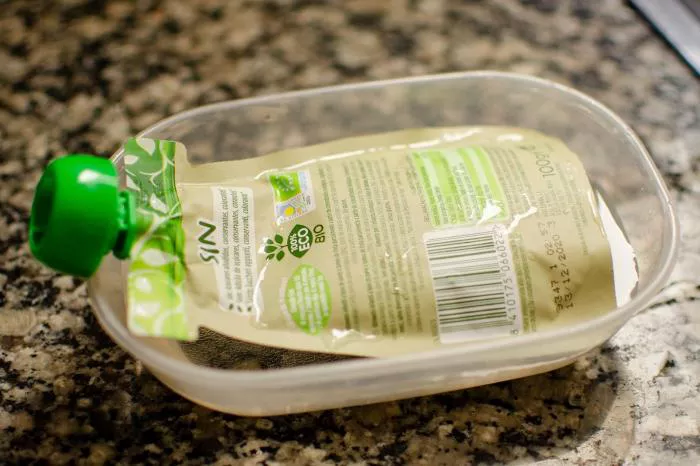In recent years, sales of baby food pouches have skyrocketed by an astonishing 900 percent, leading to heightened concerns among health professionals about the long-term effects of this trend on children’s nutrition and development. The convenience and popularity of these products have made them a staple in many households, but experts warn that reliance on pouches may have significant health implications for young children.
Rising Popularity of Baby Food Pouches
The demand for baby food pouches has surged, with toddlers and children consuming an increasing amount of blended foods. These pouches, which contain various pureed fruits and vegetables, have become the most popular form of baby food on the market over the past 14 years, according to the LA Times. Their convenience, portability, and appealing flavors have made them a go-to choice for busy parents.
While these pouches offer an easy way to provide children with fruits and vegetables, experts caution against relying on them as a primary food source. The concern lies in the nutritional composition of these products, which often contain higher levels of sugars and lower nutritional value than other packaged baby foods, such as traditional jars.
Nutritional Concerns Raised by Experts
A study published in 2019 by Nutrition Today highlighted that many food pouches consist of blends of several fruits and vegetables rather than single items, leading to potential nutritional deficiencies. The research indicated that these pouches generally have “lower nutritional value” compared to other packaged baby food options, raising alarms among pediatricians and nutritionists.
Kameron Moding, an assistant professor of Human Development and Family Studies at Purdue University, emphasized the risks associated with the high levels of sugars present in many food pouches. “The nutritional profiles differ from products sold in other packages, particularly with respect to sugars coming from fruits,” Moding stated. He pointed out that the ease of consumption may encourage parents to overlook the sugar content, which can have adverse effects on children’s health.
Recent Research Findings
In 2023, researchers conducted a comprehensive study analyzing over 650 baby food products available in grocery stores across the United States. The findings were alarming: 60 percent of the products failed to meet established nutritional recommendations, with none meeting the World Health Organization’s guidelines. The research was led by The George Institute for Global Health and examined popular grocery retailers, including Kroger, Sam’s Club, Target, and Walmart.
Among the key findings, 70 percent of the products assessed did not meet the necessary protein requirements, while 44 percent contained excessive levels of total sugars. These results highlight the potential nutritional inadequacies of many food pouches, prompting further scrutiny from health experts.
Impact on Dental Health
The sugar concentration and texture of puree pouches may also adversely affect a child’s dental health. According to Green Hills Pediatric Dentistry, consuming high-sugar foods from pouches can contribute to cavities due to prolonged contact with a child’s teeth. The dental professionals noted that the physical act of chewing food helps cleanse teeth, a benefit lost when children primarily consume pureed foods from pouches.
Dr. Steven Abrams, a professor of pediatrics at the University of Texas at Austin’s Dell Medical School, advised that food pouches should be served as snacks rather than meal replacements. “We want kids to learn to chew and eat foods like meat, and fruits and vegetables that are not processed,” he explained. This perspective was echoed by Tanya Altman, a pediatrician based in Calabasas, California, who believes food pouches should play a limited role in a child’s overall diet.
Recommendations for Parents
To help parents navigate the complexities of toddler nutrition, health experts recommend consulting the US Department of Agriculture website for official guidelines. The USDA advises serving a diverse range of foods, including fruits, vegetables, grains, protein sources, and dairy or fortified soy alternatives, while keeping sodium and sugar levels low. Encouraging children to consume whole foods instead of heavily processed options is crucial for fostering healthy eating habits.
The Importance of Variety in Diet
Experts stress the importance of introducing children to a variety of foods to ensure balanced nutrition. Exposure to different textures and flavors helps children develop healthy eating habits and preferences. Rather than relying on pouches, parents should strive to incorporate whole foods into their child’s diet, allowing for a more comprehensive approach to nutrition.
The Bigger Picture
The increasing reliance on baby food pouches reflects broader societal trends concerning convenience and accessibility in food choices. In a fast-paced world where parents are often juggling multiple responsibilities, the ease of using pouches can be appealing. However, the implications of this trend on children’s health cannot be ignored.
As the baby food pouch market continues to grow, it becomes increasingly vital for parents and caregivers to remain informed about the nutritional content of these products. Health professionals emphasize the need for vigilance when selecting foods for young children, advocating for a return to more traditional feeding practices that prioritize whole, minimally processed foods.
Conclusion
The remarkable rise in baby food pouch sales presents a multifaceted challenge for parents and health experts alike. While the convenience of these products is undeniable, the potential risks associated with their excessive consumption warrant serious consideration.
Parents are encouraged to balance the use of food pouches with a diverse array of whole foods, promoting healthy eating habits and optimal nutrition for their children. By fostering an understanding of nutrition and prioritizing whole foods, families can ensure their children receive the essential nutrients needed for healthy growth and development.
In an era where convenience often trumps nutritional value, the message is clear: while baby food pouches may be a handy option for busy families, a holistic approach to nutrition remains paramount for the well-being of future generations.
Related topics:


